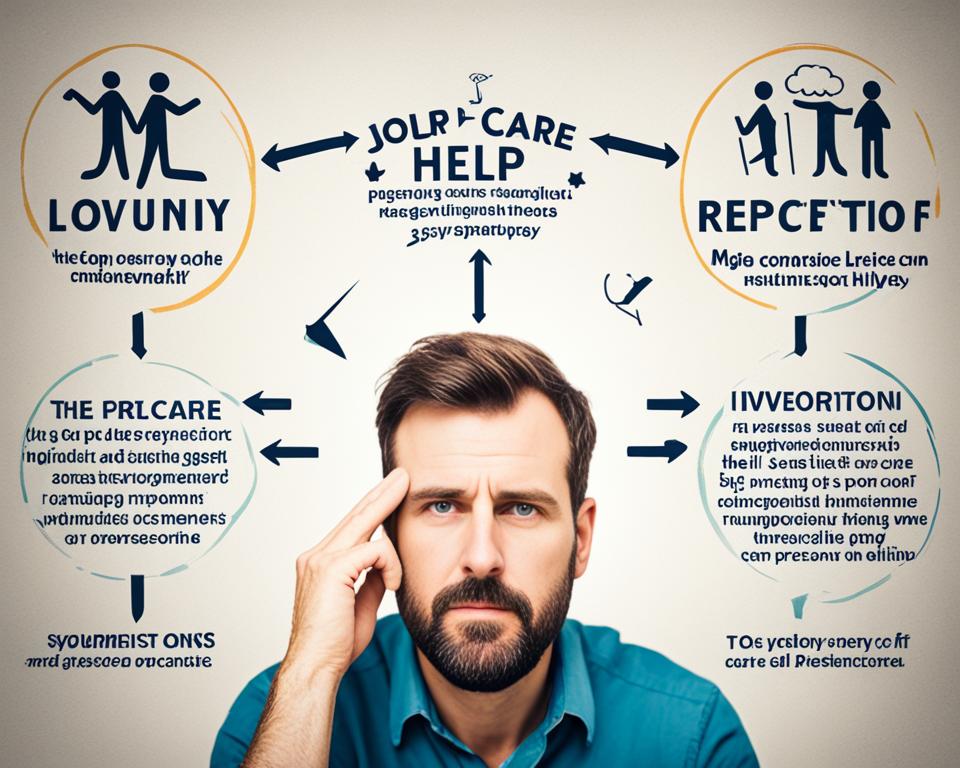Major depressive disorder (MDD) recurrent moderate is a mental health issue. It involves ongoing and recurring episodes of depression. People with this condition feel deep sadness, hopelessness, and lose interest in things they used to enjoy.
They often have multiple depressive episodes over their lives. Each episode can last for a long time.
It’s important to understand the symptoms, causes, and how it affects people. This article will give a detailed look at MDD recurrent moderate. We’ll talk about its effects on daily life and how to deal with it. We’ll cover treatments like medications, therapy, and lifestyle changes.
Read interesting things at : trainwithnexus
Key Takeaways
- Major depressive disorder recurrent moderate is characterized by persistent and recurring episodes of depression.
- This form of depression can have significant impacts on an individual’s personal and professional life.
- Treatment approaches may include antidepressant medications, psychotherapy, and lifestyle management strategies.
- Cognitive-behavioral therapy (CBT) is a common and effective form of psychotherapy for managing recurrent depression.
- Maintaining a support system and actively managing triggers and warning signs are crucial for preventing relapse and promoting long-term recovery.
Understanding Major Depressive Disorder Recurrent Moderate
Major depressive disorder recurrent moderate is a mental health issue. It brings on deep sadness, hopelessness, and a lack of interest in things you used to enjoy. People with this condition often have episodes that come and go, with times of feeling better followed by worse symptoms.
Symptoms and Diagnostic Criteria
To get a diagnosis of major depressive disorder recurrent moderate, you must show certain symptoms that make daily life hard. These symptoms include:
- Persistent feelings of sadness, emptiness, or hopelessness
- Loss of interest or pleasure in most activities
- Significant weight loss or gain, or changes in appetite
- Insomnia or excessive sleeping
- Fatigue and lack of energy
- Feelings of worthlessness or excessive guilt
- Difficulty concentrating or making decisions
- Recurrent thoughts of death or suicidal ideation
Causes and Risk Factors
Major depressive disorder recurrent moderate has many causes, including genetics, biology, and environment. Some common risk factors are:
- Family history of mood disorders
- Stressful life events, such as the loss of a loved one, relationship difficulties, or financial problems
- Certain medical conditions, such as thyroid disorders or chronic pain
- Substance abuse or addiction
- Traumatic experiences, including childhood abuse or neglect
Knowing what causes and increases the risk of major depressive disorder recurrent moderate is key to managing and treating it.
The Cycle of Recurrent Depression
People with major depressive disorder recurrent moderate often face a cycle of depression. They go through ups and downs, from being in remission to relapsing. It’s key to understand this cycle to prevent relapse and keep recovering.
The cycle of major depressive disorder recurrent moderate includes several stages:
- Initial Episode: The first time someone feels depressed, often due to stress, life changes, or genetics.
- Remission: A time when the depression lessens or goes away, thanks to treatment and self-care.
- Relapse: When depression comes back, possibly because of stopping treatment, stress, or the disorder’s nature.
How long each stage lasts and how often they happen can vary a lot from person to person. The cycle doesn’t always follow a set pattern. Spotting signs of a relapse early and taking steps to prevent it can help break the cycle. This way, you can keep fighting major depressive disorder recurrent moderate and stay on the path to recovery.
“Understanding the cyclical nature of major depressive disorder recurrent moderate is the first step towards developing a comprehensive treatment plan and preventing future relapses.”
Impacts on Daily Life and Functioning
Living with major depressive disorder recurrent moderate changes daily life a lot. It makes it hard to do everyday tasks, keep up with friends and family, and work or study. This mental health issue affects how well someone can function in their daily life.
Personal and Professional Consequences
This condition affects both personal and work life. It can make social life tough, causing people to pull away from others or find it hard to talk. At work, it can lead to not being productive, missing work, or losing a job. This is because it’s hard to focus, make choices, or meet deadlines.
- Strained personal relationships
- Difficulty maintaining daily routines and responsibilities
- Decreased work or academic performance
- Increased risk of unemployment or underemployment
- Diminished overall quality of life
Major depressive disorder recurrent moderate has big effects on a person’s life. It touches their physical, emotional, and social health. Getting the right treatment and support is key to dealing with these effects. It helps improve how well someone functions and their quality of life.
| Impact | Description |
|---|---|
| Relationship Strain | Major depressive disorder recurrent moderate can strain personal relationships, as the individual may withdraw from social activities or struggle to communicate effectively with family and friends. |
| Decreased Productivity | The condition can lead to reduced productivity, absenteeism, and even job loss, as the individual may find it challenging to concentrate, make decisions, or meet deadlines. |
| Diminished Quality of Life | The impacts of major depressive disorder recurrent moderate can diminish an individual’s overall quality of life, affecting their physical, emotional, and social well-being. |
“The personal and professional consequences of major depressive disorder recurrent moderate can be profound, but with the right treatment and support, individuals can overcome these challenges and regain control of their lives.”
Treatment Approaches for Moderate Recurrent Depression
For those with major depressive disorder recurrent moderate, treatment often combines antidepressant medications and psychotherapy and counseling. These methods help tackle the complex nature of this condition together.
Antidepressant Medications
Mental health treatment for moderate recurrent depression often starts with antidepressants. These drugs balance the brain’s chemicals like serotonin and dopamine. A healthcare provider helps find the right medication and dose for each patient.
Psychotherapy and Counseling
Psychotherapy and counseling are key alongside antidepressant medications. They focus on the emotional and thought patterns affected by depression. Therapies like cognitive-behavioral therapy (CBT) help people cope better and change negative thoughts.
Together, these treatments help manage symptoms, enhance life quality, and support long-term recovery for those with major depressive disorder recurrent moderate.
“Effective treatment for recurrent depression often requires a multifaceted approach, addressing both the biological and psychological components of the condition.”
Cognitive Behavioral Therapy for Recurrent Depression
Cognitive behavioral therapy (CBT) is a top choice for those with major depressive disorder recurrent moderate. It’s a proven therapy that helps change negative thought patterns and behaviors. This can stop the cycle of depression.
CBT sees how our thoughts, feelings, and actions are linked. With a therapist’s help, people can spot and question negative beliefs linked to depression. This can lead to a better mood and more control over mental health.
CBT is great for depression because it focuses on learning new skills. Patients and therapists work together to find coping strategies. These include
- Identifying and reframing negative thought patterns
- Engaging in regular exercise and healthy lifestyle habits
- Developing effective problem-solving and stress management techniques
- Gradually facing and overcoming avoidance behaviors
This therapy gives people the tools to avoid future depression and support long-term recovery. It’s structured and easy to follow, making it a good choice for those with major depressive disorder recurrent moderate.
| Key Benefits of CBT for Recurrent Depression | Potential Outcomes |
|---|---|
| Identification and modification of negative thought patterns | Improved mood and emotional regulation |
| Development of coping strategies and lifestyle changes | Increased resilience and ability to manage future depressive episodes |
| Gradual exposure and overcoming of avoidance behaviors | Enhanced daily functioning and quality of life |
Adding cognitive behavioral therapy to a treatment plan helps people with major depressive disorder recurrent moderate. It can help them stop the cycle of depression and aim for lasting recovery.
Lifestyle Management and Self-Care Strategies
Managing major depressive disorder recurrent moderate is more than just medical treatment. It includes lifestyle changes and self-care. These steps help support your mental health and well-being. By making these changes, you can take control of your depression and make your treatment more effective.
One key factor is physical exercise. Exercise can make you feel better and reduce depression symptoms. You can try activities like walking, yoga, or swimming daily to lift your mood and energy.
Handling stress is also vital. Learning to cope with stress through mindfulness, deep breathing, or hobbies can help. This can make you more resilient and improve your emotional health, especially if you have major depressive disorder recurrent moderate.
Good sleep habits are important too. A regular sleep schedule, a comfy sleep area, and relaxing before bed can help you sleep better. Good sleep is linked to your mental health. It can make you feel happier and more energetic, which helps with managing major depressive disorder recurrent moderate.
What you eat also matters for your mental health. Eating foods full of nutrients, like fruits, veggies, whole grains, and lean meats, supports your brain and overall health. Adding these self-care strategies to your life can help you manage your major depressive disorder recurrent moderate better.
| Lifestyle Management Strategies | Benefits |
|---|---|
| Physical Exercise | Improved mood, reduced depression symptoms, increased energy levels |
| Stress Management | Enhanced emotional well-being, increased resilience, better coping mechanisms |
| Healthy Sleep Hygiene | Improved sleep quality, enhanced mood and energy levels |
| Nutritional Considerations | Provision of necessary nutrients for brain health and overall well-being |

“Incorporating lifestyle management and self-care strategies can empower individuals with major depressive disorder recurrent moderate to take an active role in their recovery and enhance the effectiveness of their treatment plan.”
The Role of Support Systems and Resources
For those with major depressive disorder recurrent moderate, a strong support system is key. Family, friends, and peers offer emotional, practical, and psychological help. This support is vital for overcoming the challenges of this condition.
Family and Friends Support
Loved ones, like family and friends, are priceless for those with major depressive disorder recurrent moderate. They provide a listening ear and help with everyday tasks. By being understanding and open, they create a caring space that aids in healing and building strength.
Support Groups and Online Communities
Support groups and online communities also help those with major depressive disorder recurrent moderate. These places offer a safe space to share, get advice, and connect with others facing similar issues. Joining these groups can reduce feelings of loneliness and give a sense of belonging during recovery.
Using a variety of support systems and resources is crucial for managing major depressive disorder recurrent moderate. By relying on loved ones and connecting with wider communities, people can get the emotional, practical, and psychological support needed to deal with this condition.
major depressive disorder recurrent moderate
Major depressive disorder, also known as clinical depression, is a serious mental health issue. It can greatly affect someone’s daily life. When it comes back, it’s called major depressive disorder recurrent moderate. This means the person has had several episodes of depression that were pretty severe.
People with this condition often feel sad, hopeless, and lose interest in things they used to love. They might also have trouble sleeping, eating, and feeling energetic. Concentrating and making decisions can become hard for them too.
The reasons for this disorder are complex. They can be genetic, environmental, or psychological. Being at risk includes having a family history of depression, going through stressful times, certain health issues, and using substances.
Treating it often means using antidepressants, therapy, and making lifestyle changes. Cognitive-behavioral therapy (CBT) is a key therapy for dealing with negative thoughts and actions linked to depression.
Keeping a healthy lifestyle, exercising regularly, and having a strong support network helps a lot. These things are key in managing symptoms and stopping depression from coming back. By understanding this condition and getting the right treatment, people can improve their lives and handle their depression better.
Preventing Relapse and Managing Long-Term Recovery
Keeping up with long-term recovery from major depressive disorder recurrent moderate is tough but key. The secret is to stop relapse by using a strong relapse prevention plan.
Identifying Triggers and Warning Signs
Stopping relapse starts with knowing what triggers depression. This means spotting patterns or events that make things worse. By knowing these triggers, you can avoid them and stay on track.
It’s also vital to watch for warning signs of depression coming back. These signs include changes in mood, sleep, energy, or thinking. Catching these early can help stop symptoms from getting worse.
Developing a Relapse Prevention Plan
A personal relapse prevention plan is a key part of staying well. This plan should help you spot triggers and deal with them. It might include things like:
- Keeping track of your mood and feelings in a journal
- Doing things to reduce stress, like exercise or meditation
- Sticking to a regular sleep schedule and healthy habits
- Getting support from friends, family, or professionals
- Changing your treatment or medication as needed with your doctor
Having a strong relapse prevention plan helps people with major depressive disorder recurrent moderate stay stable and feel better over time.

“The key to managing long-term recovery from recurrent depression is to have a well-structured relapse prevention plan that addresses both the identification of triggers and the implementation of effective coping strategies.”
Comorbidities and Concurrent Conditions
When dealing with major depressive disorder recurrent moderate, it’s key to look at comorbidities and concurrent conditions. These issues can make treating depression harder. They need a full look at assessment and care.
Anxiety disorders often go hand in hand with major depressive disorder recurrent moderate. People may face generalized anxiety, panic attacks, or social anxiety. Substance abuse, like alcohol or drug misuse, is another big concern that often comes with depression.
Physical health problems can also mix with major depressive disorder recurrent moderate. Issues like chronic pain, heart disease, and thyroid problems can make depression worse and slow down recovery.
“Addressing comorbidities and concurrent conditions is key for treating major depressive disorder recurrent moderate. A holistic, patient-centered approach is vital for lasting mental and physical health improvement.”
| Comorbidity | Prevalence | Impact on Treatment |
|---|---|---|
| Anxiety Disorders | Up to 60% of individuals with major depressive disorder recurrent moderate | Increases symptoms, worsens treatment outcomes, and raises relapse risk |
| Substance Abuse | About 30% of individuals with major depressive disorder recurrent moderate | Makes treatment harder, lowers adherence, and increases risk of bad outcomes |
| Chronic Pain | Up to 65% of individuals with major depressive disorder recurrent moderate | Makes depression worse, hurts functioning, and needs special pain care |
It’s vital to recognize and tackle these comorbidities and conditions for effective major depressive disorder recurrent moderate management. A detailed, team-based approach that looks at both physical and mental health is key. This helps get the best results and improves patients’ overall well-being.
Specialized Care for Complex Cases
Some people with major depressive disorder recurrent moderate need more help because their cases are complex or severe. They might have other health issues, not respond to treatment, or have special situations that need a custom plan.
A team of experts like psychiatrists, psychologists, therapists, and social workers work together for these cases. This team helps understand what each person needs and creates a plan just for them.
For those who need a lot of help, staying in a hospital might be needed. In the hospital, they get care all the time, help with their medicines, and can try special treatments like ECT or TMS.
Some people might also try new treatments like deep brain stimulation or ketamine infusion. These are for people who don’t get better with usual treatments. These treatments are given at special places or by experts in treating depression.
Using a team approach and special care helps people with major depressive disorder recurrent moderate. It can make it more likely they’ll get better and live a good life.
| Specialized Care Approach | Key Components |
|---|---|
| Multidisciplinary Team |
|
| Inpatient Treatment |
|
| Advanced Therapies |
|
Healthcare providers use a mix of medicine, therapy, and special treatments for complex cases of major depressive disorder recurrent moderate. This approach helps people get the care they need for a better life.
Navigating the Mental Health System
Finding the right support and resources can be tough when you’re dealing with major depressive disorder recurrent moderate. The mental health system can be complex, but with the right steps, you can get the care you need. This helps you manage your condition better.
Finding the Right Healthcare Provider
Getting the right treatment for major depressive disorder recurrent moderate starts with finding the right healthcare provider. Here are some steps to follow:
- Understand your insurance coverage and look for mental health services that are in-network.
- Ask for recommendations from people you trust, like your doctor, support groups, or online forums.
- Check the qualifications, experience, and treatment methods of potential providers to find the best match for you.
- Have an initial meeting to see if you feel okay with the provider’s way of talking and working with them.
Working closely with a mental health professional is key to handling major depressive disorder recurrent moderate. Good communication, trust, and understanding your treatment goals are important for success.
“Finding the right healthcare provider can be a game-changer in managing recurrent depression. It’s about finding someone you can trust and work with to develop a personalized treatment plan.”
Your mental health is important, and taking time to find the right provider can really help. It can make a big difference in your recovery and managing major depressive disorder recurrent moderate.
The Importance of Ongoing Monitoring and Adjustment
Managing major depressive disorder recurrent moderate needs a flexible approach. It must change with the individual’s needs over time. Regular check-ins with healthcare providers are key. They help check on symptoms, spot new challenges, and adjust treatment as needed.
Working together with a care team is vital. This team helps check if treatments work, spot side effects, and try new therapies. By staying alert, people can handle changes in their mental health better. This helps them manage major depressive disorder recurrent moderate more effectively.
It’s important to be open with healthcare providers and take an active role in your care. Being flexible with your treatment plan is crucial. This ensures the plan meets your changing needs, helping you recover over time.


